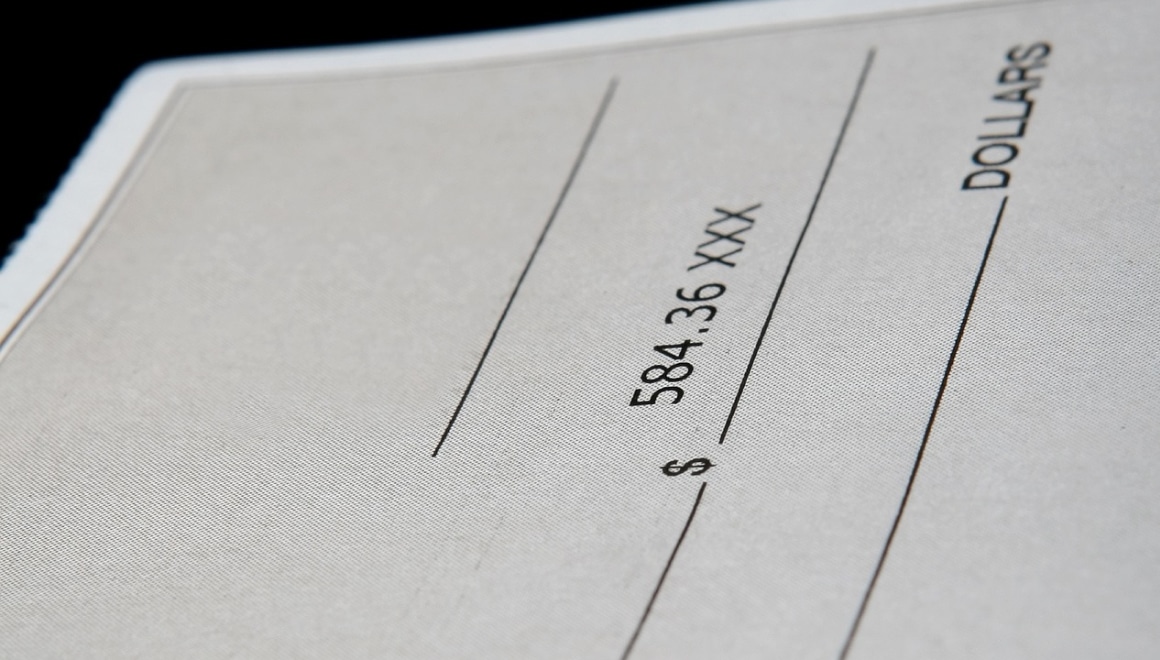Share

One new tactic that some less scrupulous loan companies have started using in recent years is sending people checks—real checks that you can actually cash—in the mail. These aren’t just the kind of promotional checks you might be used to (the ones that say they’re void, or are a teaser to try to get you to sign up for something). Instead, you can actually cash them. The letter will generally have an agreement you are supposedly agreeing to by cashing the check, and they get mailed to you out of the blue. The problem is: what happens if someone else cashes the check instead of you? The answer is you might have debt collectors calling you about a debt you never even heard of.
If someone else has cashed a check that got sent to you out of nowhere, and now a company you’ve never heard of is trying to collect debts from you, our law firm may be able to help. We represent consumers, and a big part of our practice is stopping debt collectors from improperly harassing people. Click Here to Submit Your Claim. We don’t charge for consultations and don’t charge anything to evaluate your case.
Regional Finance Company is one of the bigger companies that people have reported engaging in this kind of tactic. They operate in Alabama, Georgia, Illinois, Missouri, North Carolina, New Mexico, Oklahoma, South Carolina, Tennessee, Texas, Virginia, and Wisconsin.
What some consumers have reported is, for example, having a cashable check mailed to an old address. They might never even have seen it. But then somebody else entirely cashes the check, and you get sued for the loan.
When a company randomly sends checks in the mail to people that they didn’t ask for, we think they should bear the risk if a random person cashes it. You can’t collect a debt from someone that they don’t owe—and the Fair Debt Collection Practices Act (FDCPA), a federal law, protects people from practices like this. It gives you a right to sue if you’ve been harassed by a debt collector in various ways. And another law, the Fair Credit Reporting Act (FCRA), limits what companies can do in terms of falsely reporting that you owe debts that you don’t. State laws might protect you too, depending on your state. For example, Georgia has the Fair Business Practices Act. It just outlaws any practice that’s unfair, and mailing someone a check out of nowhere (with no protections to ensure that only they can cash it) would fall in that category.
What if I’m being told that I need to prove I didn’t cash the Regional Finance check?
Regional Finance sometimes sells its debts to other companies. For example, in a lawsuit in Charleston, South Carolina, the plaintiff’s debt to Regional Finance Corporation of South Carolina had been sold to a company called LVNV Funding LLC—which then hired another company, Dynamic Recovery Solutions LLC, to collect the debt. Smith v. Dynamic Recovery Sols. LLC, No. 2:19-cv-00135-DCN, 2019 U.S. Dist. LEXIS 93879 (D.S.C. June 5, 2019). So you might be dealing with an entirely different company that Regional Finance itself by the time someone is trying to collect from you.
One tactic those companies use is falsely telling you that it’s your job to prove to them that you don’t owe the debt—even though it came from a check that someone else was allowed to cash in your name.
If you’re being told that you need to prove you weren’t the one who cashed the check, let our firm evaluate your case. The burden of proof is on the person trying to collect the debt. They have to prove you owe it, not the other way around. Some companies or debt collectors that use this tactic (sending cashable checks to people) will claim that you have to file a police report, or even that you have to bring the police down to their offices to prove that you didn’t cash the check. None of this is true.
For example, under the federal Fair Debt Collection Practices Act, you have a right to dispute the debt. If you tell a debt collector in writing you don’t owe it within 30 days of their first letter trying to collect the debt, they have to verify the debt is valid.
If it actually comes to a lawsuit where they sued you, they have to prove the debt exists. For example, a court in Eastland, Texas made this very clear, saying “the burden of proof of the existence of the debt and the amount of the debt was placed upon the one claiming the debt.” Carter v. Johnson, No. 11-03-00178-CV, 2005 Tex. App. LEXIS 739 (Tex. App. Jan. 31, 2005). If they’re the one filing the lawsuit, they have to prove they’re entitled to what they’re asking for—and part of that is proving you’re the one who cashed the check. Depending on the facts of your case and on your state, you may even have the right to sue them back for trying to collect a debt you don’t owe.
If you’re being told you owe money because of a loan created by a check you didn’t cash—and didn’t even receive, Click Here to Submit Your Claim. We don’t charge any fees for consultation. We’ll review your case and see if you have a claim.


